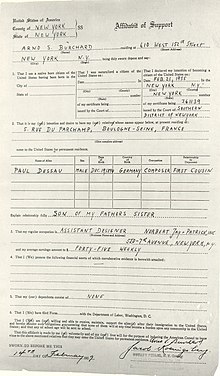Affidavit

An affidavit is in contrast to an affidavit an actual oath. The term derives from the medieval legal language. Affidavit (Latin) means: "(he) has promised"; it is the 3rd person singular perfect indicative active of affidare " insur ", "loyalty promise", "protection promise".
In countries where English or related law is applied (mainly former British colonies), the affidavit a (English by the exhibitor deponent or affiant ) signed and by the oath sworn document , which provides information about the actual conditions. Such documents are used, for example, in English civil proceedings to take evidence in the preparatory proceedings, but are also used elsewhere, e.g. B. in communication with the tax authorities.
The Commissioners for oaths appointed by Lord Chancellor , mostly solicitors , are responsible for taking the respective oaths , because they perform this task in addition to their daily practice. Abroad, it is mostly the British diplomatic representatives and consuls and also all civil servants who are authorized to take oaths in the country concerned. In the United States , an affidavit can be written by anyone, only the signature must then be confirmed by a public notary .
Affidavits played an important role during the National Socialist era . Family members, friends and qualified organizations in countries outside Germany (after the connection outside Germany and Austria) were able to enable persecuted persons to enter overseas countries (United Kingdom, USA) with a certified declaration of surety , who thereby escaped National Socialist persecution on the continent. This form of affidavit corresponds today to the declaration of commitment in immigration law .
Web links
Individual evidence
- ↑ Gefluechtet.de: efforts to the affidavit
- ↑ literaturepochen.at: Three ways into emigration